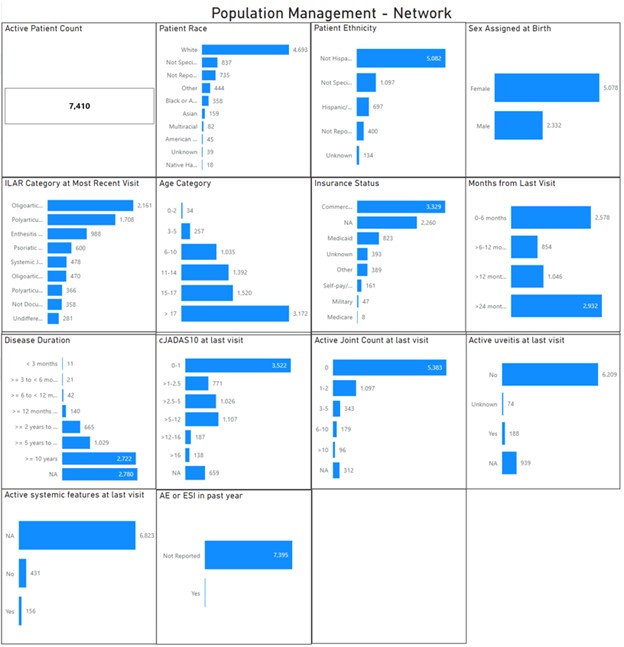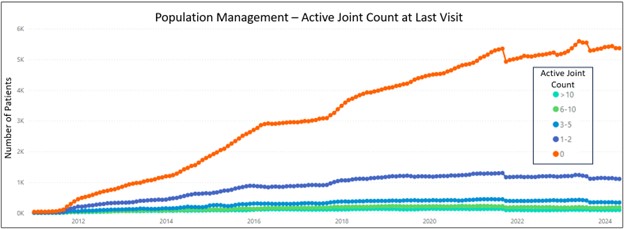Session Information
Session Type: Abstract Session
Session Time: 3:00PM-4:30PM
Background/Purpose: The Pediatric Rheumatology Care and Outcomes Improvement Network (PR-COIN) is a learning health network with a vision that children with rheumatic disease will have excellent health outcomes under the care of highly effective pediatric rheumatology teams. PR-COIN has initially focused its work on juvenile idiopathic arthritis (JIA) and hosts a shared patient registry utilizing Hive Networks platform. PR-COIN incorporates population health management (PHM) as a strategy to improving outcomes in patients with JIA. PR-COIN worked with Hive Networks to create a population management tool to enhance PHM both at the collaborative and site level.
Methods: The PR-COIN registry has collected JIA patient data from 2011 to present. Data can be stratified by demographic variables, JIA subtype, diagnosis date, provider, disease activity metrics, patient-reported outcome variables, medications, labs, and adverse events. The PR-COIN Measures Committee has been working with Hive Networks since 2022 to create a quality measure dashboard and other functionality. PR-COIN and Hive Networks are working together to optimize the approach to PHM.
Results: The population management tool (Figure 1) was created in the PR-COIN registry to assist sites in closing quality of care gaps for their active patients with JIA in the registry (13,500 total patients in registry and 7,393 active patients). The summary screen functionality includes dynamic filtering and the ability to drill down to the patient level at individual PR-COIN sites. This tool allows for identification of patients with high disease activity by assessing lists of patients with high clinical Juvenile Arthritis Disease Activity Score values, high active joint counts, active systemic features (in patients with systemic JIA), and active uveitis, for example. It can also track patients lost to follow-up based on the “months from last visit” variable. Furthermore, the tool can aid in optimizing data quality by assessing variables that are “unknown” or “not reported.” The population management tool also allows for tracking of the patient population stratified by the same variables over time (Figure 2). This allows sites to assess their population performance for different disease activity states, in addition to stratifying their population by demographics and JIA subtype for future quality improvement or research studies.
Conclusion: PHM is an important aspect of the care for patients with chronic diseases. The PR-COIN population management tool can be used to understand characteristics and status of the entire clinic population and to identify and address individual patients with gaps in care to improve measures performance and outcomes for all patients with JIA.
To cite this abstract in AMA style:
Harris J, Bingham C, Vora S, Yildirim-Toruner C, Ferraro K, Friedrichsen E, Bullock D, Burnham J, Lee T, Lovell D, Wimmel T, Mincarelli D, Patil M, Phillips M, Morgan E. Population Health Management for Juvenile Idiopathic Arthritis in the Pediatric Rheumatology Care and Outcomes Improvement Network [abstract]. Arthritis Rheumatol. 2024; 76 (suppl 9). https://acrabstracts.org/abstract/population-health-management-for-juvenile-idiopathic-arthritis-in-the-pediatric-rheumatology-care-and-outcomes-improvement-network/. Accessed .« Back to ACR Convergence 2024
ACR Meeting Abstracts - https://acrabstracts.org/abstract/population-health-management-for-juvenile-idiopathic-arthritis-in-the-pediatric-rheumatology-care-and-outcomes-improvement-network/


